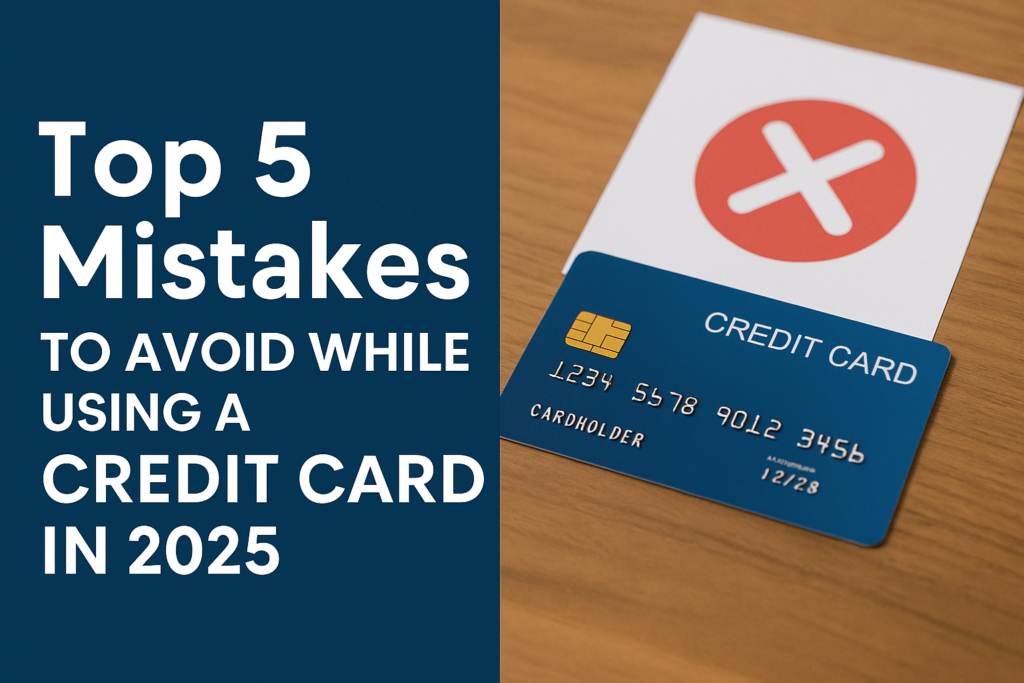Credit cards are powerful financial tools when used correctly, offering convenience, rewards, and a way to build credit history. However, if misused, they can quickly lead to debt traps, damaged credit scores, and overwhelming financial stress. In 2025, as cashless payments become even more dominant and credit card usage rises globally, it’s crucial to understand the common mistakes users make and how to avoid them. Here’s a detailed guide on the top 5 credit card mistakes you must avoid in 2025 to maintain financial health and maximize the benefits of credit cards.

1. Paying Only the Minimum Balance Each Month One of the biggest mistakes credit card holders make is paying only the minimum required amount on their monthly bills. While it might seem manageable to pay a small portion now, the reality is that the remaining balance accrues interest, often at very high rates. Over time, this leads to massive debt accumulation. Always aim to pay your full statement balance each month to avoid interest charges and keep your financial freedom intact. If full payment isn’t possible, pay as much above the minimum as you can to minimize interest.
2. Maxing Out the Credit Limit Utilizing your full credit limit sends a negative signal to lenders and can severely impact your credit score. A high credit utilization ratio (percentage of available credit you’re using) indicates financial stress and risk, even if you’re making payments on time. Ideally, you should keep your credit utilization below 30% of your total available credit. For example, if your card has a ₹100,000 limit, try to stay under ₹30,000 usage. Regularly monitoring your balances and setting usage alerts can help you maintain a healthy credit ratio.
3. Ignoring Billing Statements and Transaction Alerts Many users make the mistake of not reviewing their monthly billing statements or ignoring transaction alerts from their banks. This negligence can lead to unnoticed fraudulent charges, unauthorized subscriptions, or even billing errors that cost you money. In 2025, as digital frauds become more sophisticated, monitoring your credit card activity is more critical than ever. Always check your statements for accuracy, report any suspicious activity immediately, and enable transaction alerts to stay informed in real-time.
4. Applying for Too Many Credit Cards at Once In the pursuit of rewards or sign-up bonuses, some people apply for multiple credit cards within a short period. Each new application results in a hard inquiry on your credit report, which can temporarily lower your credit score. Moreover, handling multiple cards without a clear repayment strategy can increase the risk of debt accumulation. Instead, be strategic: choose cards that genuinely fit your lifestyle and needs, and space out new applications by at least six months to protect your credit score.
5. Missing Payment Due Dates Late payments are a surefire way to damage your credit score and incur hefty late fees. Even one missed payment can stay on your credit report for up to seven years, affecting your ability to secure loans, mortgages, or better credit card offers. In 2025, with the availability of automatic payment options and calendar reminders, there’s no excuse for missing due dates. Set up auto-pay for at least the minimum amount due, and maintain a reminder system to ensure you’re always on top of your bills.
Conclusion
Credit cards can either be a valuable asset or a dangerous liability, depending on how you manage them. By avoiding these common mistakes paying only the minimum, maxing out limits, ignoring statements, overapplying, and missing payments you can harness the full power of credit cards to build a strong credit history, enjoy rewards, and maintain financial control. Make informed choices, stay disciplined, and let your credit card work for you, not against you.